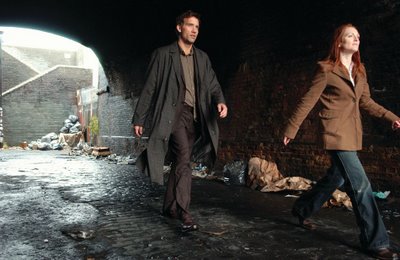

From timeout.com - you've gotta see this film. Comes out Christmas Day in the States.
Venice diary - 'Children of Men' review
Dave Calhoun looks at Alfonso Cuaron's gripping adaptation of the P D James' sci-fi novel.
Dave Calhoun | Sep 4 2006
Clive Owen and Julianne Moore in 'Children of Men'
It's fitting that Alfonso Cuaron's new film, 'Children of Men' should have its world premiere in Venice in the same week that a major celebration of new Mexican cinema opens at London's National Film Theatre. Cuaron's latest film - an adaptation of P D James' sci-fi novel - is testament to the growing influence of Mexico on current world cinema. Together with fellow director Alejandro Gonzalaz Inarritu ('21 Grams', 'Babel'), screenwriter Guillermo Arriega ('The Three Burials of Melquiades Estrada') and actor Gael Garcia Bernal, Cuaron is both revitalising the domestic Mexican industry with films such as 'Y Tu Mama Tambien' and injecting new spirit into English-language film with Hollywood-produced fare such as this latest movie.
Cuaron's first film since 'Harry Potter and the Prisoner of Azkaban' doesn't disappoint. 'Children of Men' is a clever vision of London in 2027 - an unhappy, paranoid and claustrophobic time when Britain is the only surviving nation in the world and a fertility crisis means that no new babies have been born for eighteen years. A rebel outfit of guerilla refugees (or 'fugees') known as The Fish loom threateningly in the background and the Department of Homeland Security have been ordered to arrest all illegal immigrants, cage them and propel them to the fortified compound of Bexhill-on-Sea. Never has the familliar name of a Kentish seaside town sounded so sinister. It hardly needs saying the focus on migrancy has an uneasy potency.
It's a film which easily could have been ridiculous. In Cuaron's hands, it emerges as quite some achievement, both technically (look out for the one-shot take that graces a battle scene late on) and dramatically (the script and performances are tight and credible; even Michael Caine is amusing as a cardigan-wearing, pot-smoking, Roots Manuva-listening old sage). Considering that P D James' plot is so far-fetched, it's all the more impressive that Cuaron's unhappy vision of the future is convincing. Its his boldness that makes it work. He doesn't bother with easy explanations or back story; he plunges straight into the action, shooting in an unfussy, in-your-face style and employing only the most necessary of special effects.
His prognosis of the future is gripping from the off; civil servant Theo (Clive Owen) is buying a coffee in the Square Mile when he notices a news report on TV. The newreader (a face recognisbale from television today) announces that the world's youngest person, 18-year-old Diego has died in a street brawl. It's major news. The public weep. Theo asks for a day off to recover. And it's no leap of the imagnation to connect the reaction to Diego's demise with the outpouring that greeted the death of another celebrity with a similar-sounding name back in 1997. When Owen finds himself unwitting guardian to the only pregant woman on earth, a Messianic tone infects the film, but Cuaron wisely backs off from stressing the Biblical overtones too much; at one point he pointedly pulls the needle off a choral number on the soundtrack in order to return to violent conflict.
One of the film's more striking features is that London in 2027 doesn't look so different from today's city. The red buses are more old and tatty, which contrasts nicely which the usual chrome-and-cream furnishings of the future. It still rains incessantly and the city's buildings remain grey - only many are now adorned with moving-image advertising. It's the creepy familiarlity which makes Cuaron's film so gripping and often terrifying.
No comments:
Post a Comment